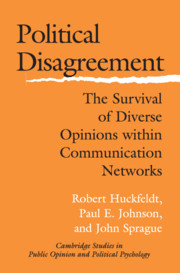Book contents
- Frontmatter
- Contents
- List of Figures
- List of Tables
- Acknowledgments
- 1 COMMUNICATION, INFLUENCE, AND THE CAPACITY OF CITIZENS TO DISAGREE
- 2 NEW INFORMATION, OLD INFORMATION, AND PERSISTENT DISAGREEMENT
- 3 DYADS, NETWORKS, AND AUTOREGRESSIVE INFLUENCE
- 4 DISAGREEMENT, HETEROGENEITY, AND THE EFFECTIVENESS OF POLITICAL COMMUNICATION
- 5 DISAGREEMENT, HETEROGENEITY, AND PERSUASION: HOW DOES DISAGREEMENT SURVIVE?
- 6 AGENT-BASED EXPLANATIONS, PATTERNS OF COMMUNICATION, AND THE INEVITABILITY OF HOMOGENEITY
- 7 AGENT-BASED EXPLANATIONS, AUTOREGRESSIVE INFLUENCE, AND THE SURVIVAL OF DISAGREEMENT
- 8 HETEROGENEOUS NETWORKS AND CITIZEN CAPACITY: DISAGREEMENT, AMBIVALENCE, AND ENGAGEMENT
- 9 SUMMARY, IMPLICATIONS, AND CONCLUSION
- APPENDIX A THE INDIANAPOLIS–ST. LOUIS STUDY
- APPENDIX B THE OPINION SIMULATION SOFTWARE
- References
- Index
APPENDIX A - THE INDIANAPOLIS–ST. LOUIS STUDY
Published online by Cambridge University Press: 03 December 2009
- Frontmatter
- Contents
- List of Figures
- List of Tables
- Acknowledgments
- 1 COMMUNICATION, INFLUENCE, AND THE CAPACITY OF CITIZENS TO DISAGREE
- 2 NEW INFORMATION, OLD INFORMATION, AND PERSISTENT DISAGREEMENT
- 3 DYADS, NETWORKS, AND AUTOREGRESSIVE INFLUENCE
- 4 DISAGREEMENT, HETEROGENEITY, AND THE EFFECTIVENESS OF POLITICAL COMMUNICATION
- 5 DISAGREEMENT, HETEROGENEITY, AND PERSUASION: HOW DOES DISAGREEMENT SURVIVE?
- 6 AGENT-BASED EXPLANATIONS, PATTERNS OF COMMUNICATION, AND THE INEVITABILITY OF HOMOGENEITY
- 7 AGENT-BASED EXPLANATIONS, AUTOREGRESSIVE INFLUENCE, AND THE SURVIVAL OF DISAGREEMENT
- 8 HETEROGENEOUS NETWORKS AND CITIZEN CAPACITY: DISAGREEMENT, AMBIVALENCE, AND ENGAGEMENT
- 9 SUMMARY, IMPLICATIONS, AND CONCLUSION
- APPENDIX A THE INDIANAPOLIS–ST. LOUIS STUDY
- APPENDIX B THE OPINION SIMULATION SOFTWARE
- References
- Index
Summary
The sample
The main respondent sample (n = 2,174) for the Indianapolis–St. Louis Study was drawn from lists of registered voters in St. Louis City and County and Marion County (Indianapolis). The response rate was 58 percent, calculated as the ratio of completions to the sum of completions, refusals, partials, and identified respondents who were persistently unavailable to complete the interview. The response rate drops to 53 percent if we add to the base those respondents in households where no one ever answered the phone after repeated call backs. The cooperation rate – completions to the base of completions, refusals, and partials – is 64 percent. Comparable rates for the discussant sample (n = 1,475) were 59 percent, 56 percent, and 72 percent.
The weekly pre-election interview target was 20 main respondents and 15 respondents at each of the two study sites, and discussant interviews were completed within three weeks of the relevant main respondent interview. After the election, interviews were completed as rapidly as possible without weekly targets, and the time spacing of main respondent and discussant interviews was not controlled. On this basis, 612 main respondents and 452 discussants were interviewed from March through June; 732 main respondents and 384 discussants were interviewed from July through the election; and 830 main respondents and 639 discussants were interviewed after the election through early January.
Eighty percent of the 2,174 main respondents responded to the request for first names of discussants.
- Type
- Chapter
- Information
- Political DisagreementThe Survival of Diverse Opinions within Communication Networks, pp. 218 - 221Publisher: Cambridge University PressPrint publication year: 2004



